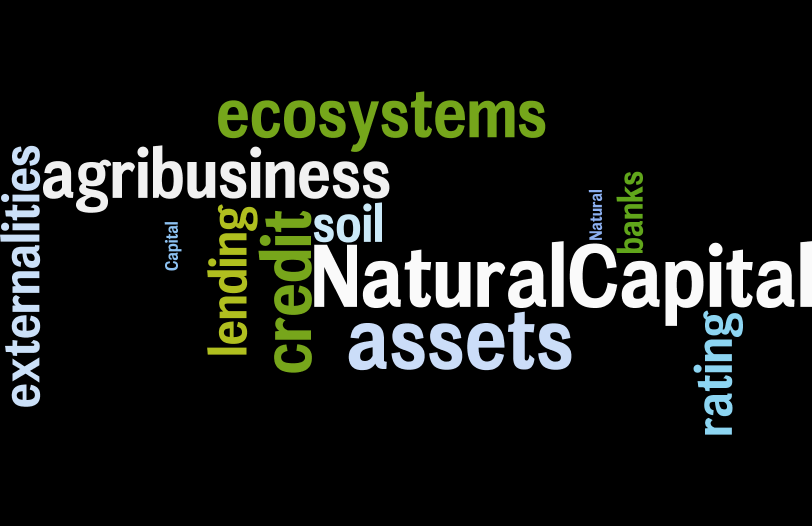It seems a little sad that we need to consider our farm assets of soil, water, plant life and nature in the context of traditional monetary terms (Natural Capital) in order for its true value to be recognised and for it to be treated appropriately. That it needs to be valued to this point for corporations, Governments and societies to treat it with the same level of importance as business products and inventory is troubling.
In the past, the effects of business on the surrounding ecosystems have been considered ‘externalities’ – “the cost or benefit that affects a party who did not choose to incur that cost or benefit.”1 If you take smoking, for example – the health costs (externalities) of smoking (which are currently absorbed by all of society in Australia, through our health systems and taxes), could be internalised and made a cost of each cigarette packet and payed for by the consumer of that product. This may have some impact on product choice.
As indicated above, externalities can also be positive, such as the bee keeper who produces honey, but who also pollinates the neighbouring crops.
Now, let’s go back to the term Natural Capital.
What is Natural Capital?
According to the World Forum on Natural Capital (2015), Natural Capital is “The world’s stocks of natural assets which include geology, soil, air, water and all living things. It is from this Natural Capital that humans derive a wide range of services, often called ecosystem services, which make human life possible.”2
According to NAB, one of Australia’s largest Agribusiness lenders,
“Ecosystems are made up of billions of living plant, animal and microbe species interacting with each other and their environment (e.g. air, water, mineral soil). They’re important to humans because they:
- Provide food, fibre and fuel (such as from biomass);
- Regulate climate and rainfall;
- Purify water, control soil erosion and regulate natural hazards
- Provide recreation, tourism and educational services; and
- Provide the conditions for photosynthesis, nutrient and water cycling and other processes….
Part of managing natural capital involves putting an economic value on ecosystem services and the natural environment”3
So, Natural Capital can be likened to the positive externalities of the natural ecosystems.
I mention NAB because they are one of a number of banks worldwide that have signed up to a Natural Capital Declaration (NCD), which is a “global statement demonstrating the commitment to the financial sector to work towards integrating natural capital criteria into financial products and services.”4
“Eventually, the change is likely to mean that farmers judged to have better environmental practices could receive higher credit ratings from the bank. General Manager of agribusiness Kahn Horne said that within three to five years the concept of natural capital was likely to feed into its credit assessments. For example, borrowers who were managing their natural resources more sustainably might eventually receive a credit rating upgrade.”5
Perhaps you like this idea, or perhaps you don’t, and the cynics may argue that the banks have another agenda for doing this (of increasing the value of the farm assets on their books). Either way, it doesn’t really matter, if the outcome is that more care is taken for the longevity of our production systems. It does however seem that natural capital influences on farm lending is coming our way, so best to be prepared. And what better way to be prepared than to be practicing regenerative agriculture.
What do you think about natural capital accounting?
References
1. ‘Externality’. 29th March 2015 <http://en.wikipedia.org/wiki/Externality>
2. ‘What is Natural Capital’. World Forum on Natural Capital. 27th March 2015. <http://www.naturalcapitalforum.com/what-is-natural-capital>
3. ‘Natural Value’. 29th March 2015. <http://cr.nab.com.au/what-we-do/natural-value>
4. Natural Capital Declaration. 29th March 2015. <http://www.naturalcapitaldeclaration.org/>
5. Yeates,C. ‘NAB to Focus on Sustainable Business Practices of Farmer Customers.’ Sydney Morning Herald. 30th March 2015. , http://www.smh.com.au/business/banking-and-finance/nab–to-focus-on-sustainable-business-practices-of-farmer-customers-20150127-12z2o1.html>


Kirrily,
Great article!, we had an expert do a valuation on the ecosystem services that were likely to be removed by mining in the Leards Forest, the final number was in the billions. We put in our submission that the assessment process should include this calculation to determine the net value to the community of the coal mine, unfortunately our suggestions were ignored. It is refreshing to see the banks starting to get on side with the idea, as they are the funders of these projects (and our own businesses) and they will hopefully start taking this into account with their funding decisions if they want to improve the environmental credibility of their “brand”. It was also great to hear that the UN has declared 2015 the Year of Soil!
Cheers guys, hope you are well.